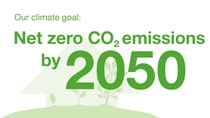Towards Net Zero
Ahead of the 2021 United Nations Climate Change Conference (COP26), David Hawkins, Chairman and Managing Director of BASF Australia and New Zealand, and the Chair of Chemistry Australia, was interviewed about the benefits a global net zero shift could bring to Victoria’s manufacturing industry. Read the full interview below.

David Hawkins is the Chairman and Managing Director of BASF Australia and New Zealand and Chair of Chemistry Australia.
Do you consider it inevitable that the globe will embrace the net zero pledge? If so, how important is it for Victoria’s manufacturing sector to get moving on this?
Given the increased societal expectation and sense of urgency, as well as the varied global dynamics towards reaching net zero, I think the commitment to embrace a net zero pledge is inevitable and the chemical industry will be a key enabler for many of the technologies needed to achieve this crucial target.
For Australia to remain globally competitive and attractive for investment, bearing in mind our continued support of the Paris Agreement targets, our local industry will need to adapt current practices, develop and implement low-emission and CO2-free technologies and increase the use of renewable energies. It’s important that we accelerate this transformation now.
What does the commitment to net zero mean for BASF in Victoria?
At BASF we create solutions for almost every value chain in Australia, from agriculture and food production, advanced manufacturing, medical technology and pharmaceuticals, through to mining equipment, technology and services.
Globally, BASF has committed to net zero emissions by 2050. Central to this long-term transition towards net zero CO2 emissions is the use of new technologies, which will replace fossil fuels such as natural gas with electricity from renewable sources. While many of these technologies are currently being pioneered by BASF and piloted with various partners around the globe, the broad scaleup will only be fully realisable after 2030. While this innovation is occurring, locally we’re progressing in several ways to make our operations more sustainable.
First and foremost, we’re continuously improving our existing plant operations, including our production facilities in Victoria. In the last 12 months, we have commenced a carbon and energy audit on all our sites across the country and installed solar panels at one of our agricultural production sites in NSW.
We have also started providing customers with Product Carbon Footprint data for our products so that they can better measure and reduce the CO2 footprint of their activities and end products. By calculating the CO2 footprint, we can create much greater transparency for our customers regarding the specific emissions for each BASF product. In some instances, we can also create opportunities to reduce the carbon footprint of selected products by offering alternative raw materials or energy sources.
Research & Development (R&D) is also central to our local operations. BASF invests significantly in R&D to bring new solutions to market and to continuously improve our existing product portfolio. One example is our Agricultural Breeding Centre in Longerenong, where research focuses on developing wheat and oilseed varieties with higher yields to help improve sustainability and productivity for Australian farmers. We also have an R&D laboratory at Monash University where our scientists are involved in developing sustainable solutions for our Dispersions and Resins business, like low VOC (Volatile Organic Compound) paints.
One of the biggest challenges BASF, and the manufacturing industry in general, face is waste management. I think significant investment in infrastructure is needed to reduce waste, marine and other litter, to support a circular economy.
Access to reliable and affordable energy is another challenge. The use of renewable energy in the chemical industry is the right and necessary step, however, industry and regulators need to work together on solutions and mechanisms to enable reliable and flexible supply at competitive prices. Companies like BASF need predictable and stable climate and energy policy frameworks that are market-oriented and cost-effective.

How should the industry and community think about the goal of net zero?
It’s vital that Australia remains globally competitive and attractive for investment. For this to happen, we need to foster a social and economic environment that enables our industry to prosper, values science and continues to improve the lives of Australians and our environment.
There’s no doubt that as part of our social license to operate we need Australia’s entire manufacturing value chain to work together towards net zero. Given the chemical industry’s role in supplying raw materials and end products to 108 of Australia’s 114 industries, we acknowledge that the actions taken by the chemical industry will be reflected in all subsequent value chains.
As the third largest manufacturing sector in Australia, the chemical industry is already playing a significant role in driving this innovation. In fact, some of the top climate response solutions contributing to Australia’s Paris Agreement Targets are enabled by the chemical industry - solutions like insulation materials, marine coatings, batteries, wind turbines, fertilisers and lightweight packaging.
In producing these materials, carbon compounds are key building blocks. The challenge our industry faces is how we effectively reduce and capture carbon emissions. From BASF’s perspective, we strive for true reduction and avoidance. We acknowledge that offsetting may need to be part of the overall industry approach.
We clearly still have a lot of work to do in this area, however I’m optimistic about our ability to solve these challenges. With new technologies will come new industries and new skills. As a sector, we’re continuously improving the energy efficiency and intensity of our own operations. We are putting our brightest minds to work on the development of transformational technologies and innovations that cut emissions and improve energy efficiency throughout the value chain to enable a socially, environmentally and economically sustainable future.
Is achieving net zero more of a challenge for chemical makers?
As the population grows, we need to produce more food from less land, using fewer resources, under tough environmental conditions. As cities grow rapidly, we need to combat issues like air quality, energy usage and re-using and recycling building materials.
As an industry, we take seriously the responsibility of meeting these challenges to ensure every Australian has access to fresh food, clean drinking water, healthcare, energy and storage technologies, and quality building materials for our towns and cities.
There’s no denying that achieving net zero for a chemical company is a big challenge. In creating chemistry, we create chemical reactions that rely on carbon compounds, and the chemical industry is a very energy intense industry. By the same token, it also means that the impact that we can, and will, have is huge. We need to explore a well-structured and very ambitious carbon management program, in partnership with our R&D powerhouses around the world.
What support do you need from government?
We need reliable and affordable energy and feedstock, as manufacturers in all states remain concerned about mitigating their energy costs. Climate change policy should be part of a globally coordinated action to reduce emissions and mitigate the impact of climate change. We recognise our Paris Agreement commitments and strive for solutions that ensure continued industry investment and job growth.
We also need to consider the growing skill shortages and the need for experienced, technical and specialist tasks. Manufacturing and R&D are often co-located, so when I think about the challenges ahead, I also think about the need to develop and attract the people we want to drive this innovation.
Balance is also needed when it comes to the chemical industry’s regulation in Australia. Globally our regulations are often recognised as inconsistent, complex and costly, which causes business to avoid investment.
Action on climate change should play a key role in Australia’s recovery from the economic cost of responding to COVID-19 and getting people back to work. As we look for greater supply chain reliability though local manufacturing, considerations around carbon emissions need to remain front of mind.
We must recognise that these industry-wide transitions to net zero will come at very significant capital and innovation costs. Government can provide grants to aid this transition, though in the long term these investments should be sustained through improved efficiency or return from the market.